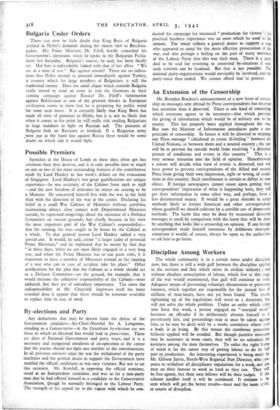Possible Premiers
Speeches in the House of Lords in these days often get less attention than they deserve, and it is only possible here to touch on one or two of the more outstanding features of the contribution made by Lord Hankey to last week's debate on the evacuation of Singapore. Lord Hankey's two great qualifications are unique experience—he was secretary of the Cabinet from 1916 to 1938 —and the new freedom of utterance he enjoys on ceasing to be a Minister. He concerned himself less with the war in the field than with the direction of the war at the centre. Declaring his belief in a small War Cabinet of Ministers without portfolio, maintaining always close contact with Departmental Ministers outside, he expressed misgivings about the existence of a Defence Committee on various grounds, but chiefly because in his view the most important part of the War Cabinet's responsibility— that for running the war—ought to be borne by the Cabinet as a whole. To that general reason Lord. Hankey added a very special one. It would, he said, create "a larger cadre of potential Prime Ministers," and he explained that he meant by that that "in these days, when we are most likely engaged in a very long war, and when the Prime Minister has to run great risks, it is important to have a number of Ministers trained in the running of a war who can in case of accident take his place." Other justifications for the plea that the Cabinet as a whole should act as a Defence Committee—on the ground, for example, that it would increase the collective responsibility of the Cabinet—were adduced, but they are of subsidiary importance. The more the indispensability of Mr. Churchill impresses itself the more essential does it appear that there should be someone available to replace him in case of need.


























 Previous page
Previous page